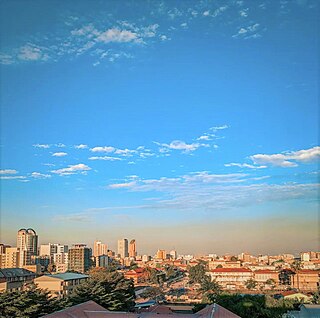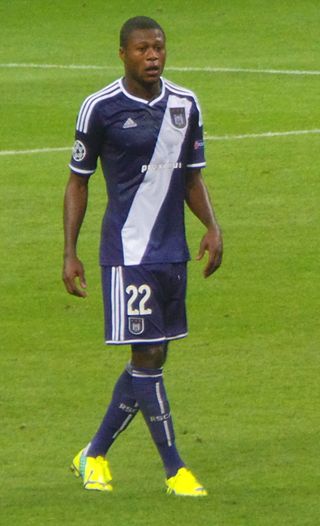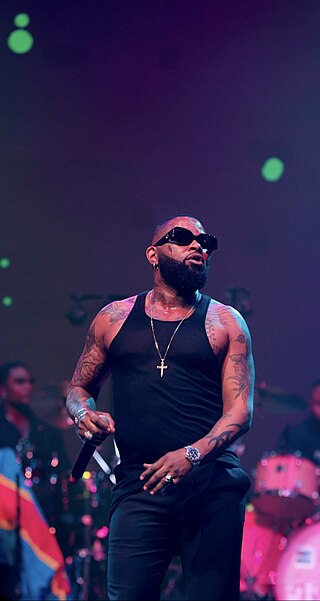Related Research Articles

Kinshasa, formerly named Léopoldville until 30 June 1966, is the capital and largest city of the Democratic Republic of the Congo. Once a site of fishing and trading villages along the Congo River, Kinshasa is now one of the world's fastest-growing megacities. Kinshasa's 2024 population was estimated at 17,032,322. It is the most densely populated city in the DRC, the most populous city in Africa, the world's fourth-most-populous capital city, Africa's third-largest metropolitan area, and the leading economic, political, and cultural center of the DRC. Kinshasa houses several industries, including manufacturing, telecommunications, banking, and entertainment. The city also hosts some of DRC's significant institutional buildings, such as the Palais du Peuple, Palais de la Nation, Court of Cassation, Constitutional Court, Cité de l'Union Africaine, Palais de Marbre, Stade des Martyrs, Immeuble du Gouvernement, Kinshasa Financial Center, and multiple federal departments and agencies.

Brazzaville is the capital and largest city of the Republic of the Congo. Administratively, it is a department and a commune. Constituting the financial and administrative centre of the country, it is located on the north side of the Congo River, opposite Kinshasa, the capital city of the Democratic Republic of the Congo.

The Democratic Republic of the Congo, also known as the DR Congo, the DRC, or Congo-Kinshasa, is a country in Central Africa. By land area the Congo is the second-largest country in Africa and the 11th-largest in the world. With a population of around 109 million, the Democratic Republic of the Congo is the most populous Francophone country in the world. The national capital and largest city is Kinshasa, which is also the economic center. The country is bordered by the Republic of the Congo, Central African Republic, South Sudan, Uganda, Rwanda, Burundi, Tanzania, Zambia, Angola, the Cabinda exclave of Angola, and the South Atlantic Ocean.

The DR Congo national football team, recognised by FIFA as Congo DR, represents the Democratic Republic of the Congo in men's international football and it is controlled by the Congolese Association Football Federation. They are nicknamed Les Léopards, meaning The Leopards. The team is a member of FIFA and the Confederation of African Football (CAF).

Goma is the capital and largest city of the North Kivu Province in the eastern region of the Democratic Republic of the Congo (DRC). It is located on the northern shore of Lake Kivu, next to the Rwandan city of Gisenyi. It shares its borders with Bukumu Chiefdom to the north, Rwanda to the east, Masisi Territory to the west, and is flanked by Lake Kivu to the south. The city lies in the Albertine Rift, the western branch of the East African Rift System, and is only 13–18 km (8–11 mi) south of the active Nyiragongo Volcano. With an approximate area of 75.72 square kilometers, the city has an estimated population of nearly 2 million people according to the 2022 census, while the 1984 estimate placed the number at 80,000.

Zaïko Langa Langa is a Congolese rumba band formed in Kinshasa, in December 1969. Established by D.V. Moanda, Henri Mongombe, Marcellin Delo and André Bita, the band evolved from the Orchestre Bel Guide National, which is seen as Zaïko's predecessor.

Antoine Christophe Agbepa Mumba, known professionally as Koffi Olomidé, is a Congolese singer-songwriter, dancer, producer, and founder of Quartier Latin International. Often referred to as the "King of Ndombolo", he is noted for his explosive high notes, deep baritone, and offbeat voice. Agbepa is considered one of the most significant figures in 20th-century Congolese and African popular music. His lyrics often explore themes of love, politics, technology, success, infidelity, religion, chicanery, and disillusionment. Through his music and stage performances, he introduced the slower style of soukous known as Tcha Tcho and popularized a flamboyant fashion subculture called La Sape, alongside Papa Wemba.

The Stade des Martyrs de la Pentecôte, or commonly referred to as the Stade des Martyrs, is the national stadium of the Democratic Republic of the Congo, located in the Kinshasa commune of the capital Kinshasa. With a seating capacity of 80,000, it is the largest stadium in the Democratic Republic of the Congo and the fourth-largest stadium in Africa. It serves as the home stadium for the Congolese football national team, Association Sportive Vita Club, and Daring Club Motema Pembe, making it the largest multifunctional venue in the country.
Marie-Claire Mboyo Moseka, known professionally as M'bilia Bel, is a Congolese singer and songwriter. Dubbed the "Queen of African Rumba" and "Queen Cleopatra", she is regarded as one of the most influential figures in 20th-century Congolese and African popular music. Her music is a blend of traditional Congolese rumba, soukous, rap, and zouk, with lyrics that often delve into themes of love, politics, hedonism, militancy, jealousy, sentimentality, and education.

Ndombolo, also known as dombolo, is a genre of dance music originating in the Democratic Republic of the Congo. Derived from soukous in the 1990s, with fast-paced hip-swaying dance rhythms, often accompanied by upbeat, percussion-driven music, the style became widespread in the mid-1990s and the subsequent decade, dominating dancefloors in central, eastern, and western Africa. It inspired West African popular music, coupé-décalé, Kuduro, and East African dance music.

Gombe, also known as La Gombe, or Downtown Kinshasa, is one of the 24 communes of Kinshasa, in the western part of the Democratic Republic of the Congo (DRC). Encompassing a vast area of approximately 29.33 square kilometers, it is home to an approximate population of 49,024 residents (2014).

The University of Kinshasa, colloquially known as UNIKIN, is a public university located in Kinshasa's Lemba commune within the western region of the Democratic Republic of the Congo. It is the country's premier university. Initially established in 1954 as Lovanium University during Belgian colonial rule, the current university was established following the division of the National University of Zaire (UNAZA) in 1981.

Democratic Republic of Congo formerly known as Zaire is a country located in central Africa. Its the second largest country in Africa and 11th in the world.

Fally Ipupa N'simba, known professionally as Fally Ipupa, is a Congolese singer-songwriter, dancer, philanthropist, guitarist, and producer. Often referred to as the "Prince of Rumba", he is noted for his tenor vocals as well as his blend of contemporary and traditional Congolese music genres, including Congolese rumba, soukous, and ndombolo. His lyrics often cover themes of romance, suffering, and joy.

Chancel Mangulu Mbemba is a Congolese professional footballer who plays as a centre-back or full-back for Ligue 1 club Marseille and serves as captain for the DR Congo national team.

Innocent Didace Balume, known professionally as Innoss'B, is a Congolese singer-songwriter, rapper, percussionist, dancer, and philanthropist. Often referred to as the "Jeune Leader", he is renowned for pioneering the AfroCongo music genre, an eclectic fusion of Congolese rumba, indigenous folklore, and ndombolo.

Hervé Gola Bataringe, known professionally as Ferré Gola, is a Congolese singer-songwriter, dancer, and record producer. Revered as "Jésus de Nuances", he is regarded as one of the most significant figures of the fifth-generation Congolese rumba. His lyrics predominantly revolve around themes of love, social support, and interpersonal relationships.

BK Arena is a multi-purpose indoor arena in Kigali, Rwanda, used mostly for basketball and volleyball matches. Built and finished in 2019, it hosts sporting events and concerts. It is the biggest indoor arena in East Africa and is located next to the Amahoro Stadium.

General elections were held in the Democratic Republic of the Congo on 20 December 2023. Combined elections were held for the President, 484 of the 500 members of the National Assembly, 700 of the 716 elected members of the 26 provincial assemblies, and for the first time under the new constitution, 951 members of a scaled down number of commune (municipal) councils. On election day, the Congolese government extended voting to 21 December for polling stations that had not opened on 20 December. Agence France-Presse reported that some polling stations would open as late as 24 December.
Italy defeated Australia 2-0 in the final tennis match of the 2023 Davis Cup. It was the 111th edition of the Davis Cup, an international team competition between national teams in men's tennis, and was part of the 2023 ATP Tour calendar.
References
- ↑ Philémon (9 July 2022). "Basketball - DR Congo: The construction of Kinshasa Arena in sight - At a glance". Sport News Africa. Retrieved 21 March 2024.
- ↑ "La RDC signe un contrat avec la société turque « SUMMA » pour la construction de « Kinshasa Arena »". www.aa.com.tr. Retrieved 21 March 2024.
- ↑ "Kinshasa : lancement officiel des travaux de construction de l'Arena". nzadinews.net (in French). 31 October 2023. Retrieved 21 March 2024.